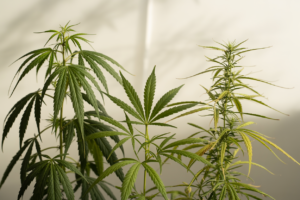- AI That Checks Before You Post
Cannabis Marketing in 2025: Navigating Social Media Bans

Contents
Contents
The cannabis industry faces a unique paradox: explosive growth paired with severe marketing restrictions. While Grand View Research projects the global cannabis market to exceed $100 billion by 2030, Cannabis Marketing professionals struggle daily with shadow bans, account suspensions, and content restrictions on major platforms.
If you’ve ever wondered why your favorite dispensary’s Instagram post disappeared overnight, or why cannabis brands seem invisible on Facebook, you’re witnessing the real challenge of Cannabis Marketing in the digital age. But here’s the good news: innovative businesses are finding powerful new ways to connect with audiences despite these obstacles.
The Cannabis Marketing Landscape: Understanding Platform Restrictions
Facebook, Instagram, and Google impose strict limitations on cannabis advertising, often shadow-banning content or flagging accounts without warning. According to Forbes, these restrictions cost the industry an estimated $3.8 billion annually in lost marketing opportunities.
The challenge isn’t just frustrating—it’s fundamentally reshaping how cannabis businesses operate. Josefine Nowitz, co-founder of Cannabis Creative Group in Newton, Massachusetts, explains the delicate balance: “AI helps us steer content to be more friendly for a 21-plus audience while avoiding common pitfalls like content geared toward minors or showing consumption.”
Major platforms enforce these restrictions for several reasons, including federal cannabis prohibition in many countries, advertising standards that prioritize user safety, and concerns about youth exposure to cannabis content.
How AI is Revolutionizing Cannabis Marketing
Artificial intelligence has emerged as a game-changer for Cannabis Marketing strategies. Rather than replacing human creativity, AI tools support marketers in developing compliant, effective campaigns that slip past algorithmic censorship.
AI-Powered Content Strategy
Marketing agencies are using AI to brainstorm creative strategies, develop compliant content, and optimize campaigns. The technology analyzes successful posts, identifies patterns that avoid triggering platform algorithms, and suggests alternative phrasing that maintains message integrity while meeting compliance requirements.
Chris Thompson, director of operations and marketing at The Daily Green in New York City, reports dramatic efficiency gains: “What would have taken a larger team a few days to create can now be done by a small team in a few minutes with AI assistance.” However, he’s clear about AI’s limitations—The Daily Green avoids AI-generated images, preferring artist-created visual content that “feels much more aligned with our brand vision and is better suited to follow strict cannabis compliance guidelines.”
Audience Segmentation and Targeting
AI-powered platforms like Alpine IQ and SpringBig help Cannabis Marketing professionals identify audience behaviors, geotargeted regions, and competitive differentiators. According to Business Wire, businesses using AI segmentation tools see 35-50% higher engagement rates compared to generic mass marketing approaches.
These tools allow agencies to create hyper-targeted campaigns that comply with state-specific regulations while standing out in a crowded market. Rather than sending one message to thousands, smart marketers now send dozens of personalized messages to smaller, highly relevant audiences.
Retail Innovation: AI at the Point of Sale
Cannabis retailers are embracing AI to enhance customer experiences and streamline operations in ways that transform Cannabis Marketing from broadcast to conversation.
Sweed, a Burbank, California-based software provider, integrates AI into point-of-sale systems to recommend products based on customer preference and purchase history. If a customer buys a specific strain, the AI suggests similar products, increasing upsell opportunities and customer satisfaction.
Rocco Del Priore, co-founder of Sweed, explains the shift: “Cannabis had this habit of designing one message and sending it out to all of their customers. Our effort is to send fewer messages but target them.” The platform offers over 100 segmentation keys that determine characteristics like age or average spend, allowing retailers to design campaigns that re-engage at-risk customers or reward high-value shoppers.
The impact is measurable. Del Priore notes that while generic messages to 20 people might yield five purchases, targeted AI-driven messages to 10 people can generate seven responses. “What if you get one that says you purchased a lot of this and there’s this new product? That is going to build a little more trust because someone took some time to give you something that’s relevant.”
Creative Workarounds for Social Media Restrictions
While AI provides sophisticated tools, Cannabis Marketing success still requires human creativity to navigate platform restrictions. Here are the strategies working in 2025:
Euphemistic Language and Lifestyle Branding
Successful cannabis brands avoid direct product promotion, instead focusing on lifestyle content, educational materials, and wellness messaging. Terms like “plant medicine,” “botanical wellness,” and “herbal remedies” often fly under algorithmic radar while still communicating value to informed audiences.
Educational Content as Marketing
Leafly’s industry analysis shows that educational content performs 3x better than promotional material in avoiding platform restrictions. By teaching audiences about cannabinoids, terpenes, consumption methods, and wellness benefits, brands build authority while staying compliant. For more insights into how the Cannabis Industry in 2025: Navigating Legal and Tech Shifts is evolving, check out our comprehensive guide.
Community Building Over Direct Promotion
Rather than pushing products, smart Cannabis Marketing focuses on building communities around shared values—wellness, natural medicine, social justice, or sustainable agriculture. These communities become self-sustaining marketing engines that platforms view as legitimate social engagement rather than advertising.
Geotargeted Email and SMS Campaigns
With social media unreliable, email marketing and SMS loyalty programs have become primary channels for Cannabis Marketing. Mailchimp research indicates cannabis email campaigns average 25% open rates—significantly higher than the 18% industry average—because audiences actively opt in to receive this otherwise hard-to-find content.
The Future: Personalized Cannabis Recommendations
On the cutting edge of Cannabis Marketing is Bud-E, a platform combining human genetics with plant genetics to recommend cannabis strains tailored to individual needs. Founder Colin Fraser describes the revolutionary approach: “Imagine being able to say, ‘I have back pain – what’s the best product for me?’ Our system uses AI to match your genetics with the right cannabis strain and even tells you where to buy it.”
This level of personalization positions cannabis as a legitimate wellness tool rather than just a recreational product. By capturing data on how products affect users, platforms like Bud-E are paving the way for more informed clinical trials and regulatory trust—ultimately benefiting the entire Cannabis Marketing ecosystem.
Research published in the Journal of Cannabis Research supports this personalized approach, showing that individualized cannabinoid recommendations improve therapeutic outcomes by up to 60% compared to generic suggestions.
Consumer Perspective: Finding Products When Advertising is Banned
For cannabis consumers, these marketing restrictions create real challenges. How do you discover new products when traditional advertising doesn’t exist?
Smart consumers follow these strategies:
- Subscribe directly to brand newsletters – Get updates that never reach social media
- Join cannabis-focused platforms – Weedmaps and Leafly aggregate product information platforms won’t show
- Follow industry educators – Influencers who focus on education rather than promotion often maintain stable accounts
- Use dispensary loyalty programs – AI-powered recommendations come directly to your phone
According to Brightfield Group consumer data, 68% of cannabis users now discover new products through direct brand communication rather than social media advertising. If you’re in Greece, explore our guide to Athens Cannabis Dispensaries: Where to Buy and What to Know.
Compliance Tools: AI That Checks Before You Post
One of AI’s most valuable Cannabis Marketing applications is pre-publication compliance checking. Tools analyze content for prohibited terms, imagery that might violate platform policies, and messaging that could target underage audiences.
These systems flag potential issues before publication, dramatically reducing account suspensions. Adweek reports that brands using AI compliance tools experience 78% fewer content violations compared to manual review processes.
Success Stories: Brands That Cracked the Code
Cannabis Creative Group’s work with multiple dispensaries demonstrates the power of strategic Cannabis Marketing. By combining AI-driven audience insights with creative storytelling, they’ve helped clients achieve:
- 45% increase in website traffic from organic social engagement
- 60% improvement in email campaign performance
- 30% reduction in customer acquisition costs
The key? Human creativity guided by AI insights. As Nowitz emphasizes: “AI is like the internet or email when it first started – it’s a game-changer. But at the end of the day, it’s the people behind the prompts and strategies that make the difference.”
To see how innovation is transforming the industry, read about 10 Cannabis Dispensary Trends Transforming Europe’s Weed Scene in 2024.
Looking Ahead: The Evolution of Cannabis Marketing
While AI is already transforming Cannabis Marketing, its potential is just beginning to unfold. As laws evolve and technology advances, expect to see:
- Virtual budtenders providing 24/7 product recommendations
- Predictive analytics that anticipate customer needs before they articulate them
- Blockchain verification creating transparent, compliant marketing pathways
- Voice-activated shopping integrating with home assistants
- Augmented reality product visualization for at-home exploration
Market forecasts predict the cannabis technology sector, including Cannabis Marketing tools, will grow 42% annually through 2030. Learn how Cannabis Tourism Tech: How Digital Tools Shape Travel is reshaping consumer experiences.
Your Cannabis Marketing Strategy for 2025
Whether you’re a cannabis business owner or a consumer trying to stay informed, here’s your action plan for navigating this complex landscape:
For Businesses:
- Invest in AI-powered segmentation and personalization tools
- Build direct communication channels (email, SMS) independent of social platforms
- Focus on educational content that provides value beyond promotion
- Develop community around shared values rather than products
- Use AI compliance tools before publishing any content
For Consumers:
- Subscribe to newsletters from your favorite brands and dispensaries
- Join cannabis-focused platforms for product discovery
- Look for businesses using personalized recommendation systems
- Share your preferences with retailers to receive relevant suggestions
Discover premium products with our Mellow Fellow: Guide to Premium Cannabis Vapes and Edibles.
Conclusion: Cannabis Marketing is About Connection, Not Just Compliance
The restrictions facing Cannabis Marketing aren’t going away soon, but they’re driving innovation that ultimately benefits everyone. AI tools, creative strategies, and personalized approaches are creating deeper connections between brands and consumers—connections built on trust, education, and genuine value rather than interruptive advertising.
As the industry matures, these sophisticated Cannabis Marketing strategies will become standard practice, distinguishing professional operations from amateur competitors. The businesses that master these tools today—combining AI efficiency with human creativity and authentic community building—will dominate tomorrow’s market.
The future of Cannabis Marketing isn’t about outsmarting algorithms; it’s about building relationships that platforms can’t ban because they’re too valuable to users. And that’s exactly what the best marketers have always done, regardless of industry.




